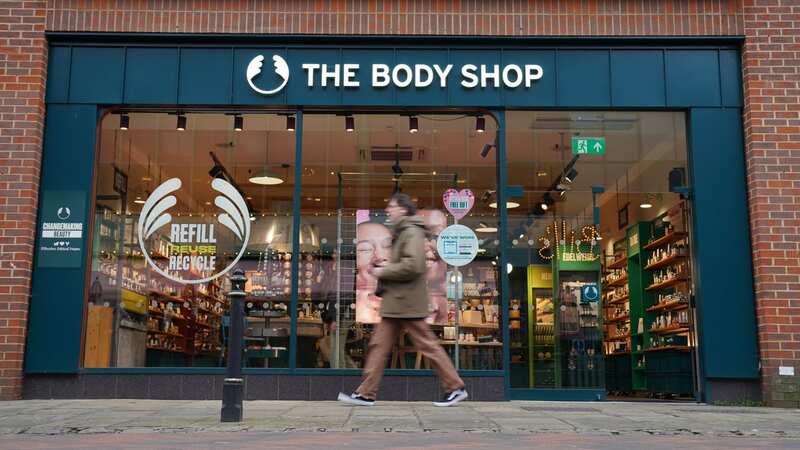The Body Shop: Where did it all go wrong for the pioneering beauty brand?

The Body Shop, a popular high street retailer specialising in beauty items, went into administration on Tuesday due to lower customer demand.
This announcement puts the brand's 200 shops and thousands of employees at risk in the UK. Administrators aim to create "a more nimble and financially stable UK business" through this restructuring.
The loss, however, is a major hit for the company's workforce and loyal customers. Let's take a look at how The Body Shop landed in this situation and what might the future hold.
What is The Body Shop?
The Body Shop, offering cosmetics and skincare products both online and in-store, had around 215 local stores at the end of last year. Notably, the brand's global franchises won't be affected by this insolvency process. Founded in Brighton in 1976 by Anita Roddick and her husband Gordon, the company was one of the first to champion ethical consumerism, exclusively selling its own ethically-made goods.
 The Body Shop launches new hair care range for afro hair that 'makes curls pop!'
The Body Shop launches new hair care range for afro hair that 'makes curls pop!'
Who has owned the business?
Anita Roddick saw rapid growth in the business during her 30 years as leader. Particularly, the venture enjoyed specific success on UK high streets during the 80s and 90s. "In the 1980s, the Body Shop was the place to go for young shoppers to splash out on fresh scented bubbles and beauty ranges, with a deep environmental conscience and a focus on social justice and conserving nature," said Susannah Streeter, head of money and markets at Hargreaves Lansdown.
The group then went public on the London Stock Exchange in 1984, raising £80 million. The business kept growing for another two decades, but its founders, Ms Roddick and Gordon, faced criticism when they sold the company to French giant L'Oreal for £652 million in 2006. Sadly, Ms Roddick passed away a year later at 64 from a brain haemorrhage.
Under L'Oreal's ownership, the company saw some changes, including moving production to the Philippines and using discounts to boost sales. After expanding internationally, the company was bought by Natura & Co, the Brazilian owners of Avon who specialised in direct-to-consumer sales, for £880 million. Six years on, the company changed hands again, being sold for a reduced price of £207 million to German private equity firm Aurelius.
When did it first face financial troubles?
Under L'oreal, the group expanded significantly but saw sales growth slow down. However, it remained financially stable before being sold to Natura & Co. In the past few years, the company's profits have been hit hard by rising production costs, a drop in consumer demand and a weak US market. This led to a loss of £71 million in 2022 after its turnover fell by nearly a fifth.
Why has it struggled?
The administrators, FRP, said that the business had faced ongoing financial difficulties under previous owners, along with a tough trading environment for the wider retail sector. Despite some areas of the sector seeing growth, the company struggled with reduced consumer spending. GlobalData analyst Tash van Boxel said the company was "ahead of its time" with its original brand identity but found it hard to compete with new rivals who offered more variety in recent years.
She said: "While The Body Shop continues to stand by its ethical and cruelty-free brand values, these claims have become industry standards, weakening The Body Shop's point of difference. Indeed, not only are brands now offering products with similar claims, but they also bring more to the table to attract shoppers."
High street competitor Lush has seen strong growth in recent years due to its strong ethical stance and colourful products. The company has also lost out to the fast growth of online-focused competitors like The Ordinary and Sephora.
 Nurse says 'first my daughter then my husband died because of Tory NHS cuts'
Nurse says 'first my daughter then my husband died because of Tory NHS cuts'
What does the administration mean?
Administrators step in to help a company when it's in big trouble, trying to get money back for people the business owes, like suppliers. FRP Advisory got the job on Tuesday to look at offers for parts of the company. They want to save as many jobs and shops as they can, but their main job is to make sure they get as much money as possible back for the creditors.
They might sell the whole company, break it up and sell pieces, or just sell things like the brand or what's left in stock, depending on who wants to buy. Jeremy Whiteson, an expert at Fladgate, said: "It is hoped that a solution can be found which safeguards the jobs of staff. However, it seems likely that many buyers will simply be interested in the brand and stock, shifting the business to an online operation or to be integrated into a multi-brand retailer."
What about the workers' future?
Right now, the company says it will keep selling things in shops and online like usual while adminstrators look at the business. Exactly how many people work there are unknown, but it's thought to be thousands in the UK stores and London office. The administrators haven't said if people will lose their jobs yet, but they've promised to tell the workers what's happening soon.
Read more similar news:
Comments:
comments powered by Disqus

































